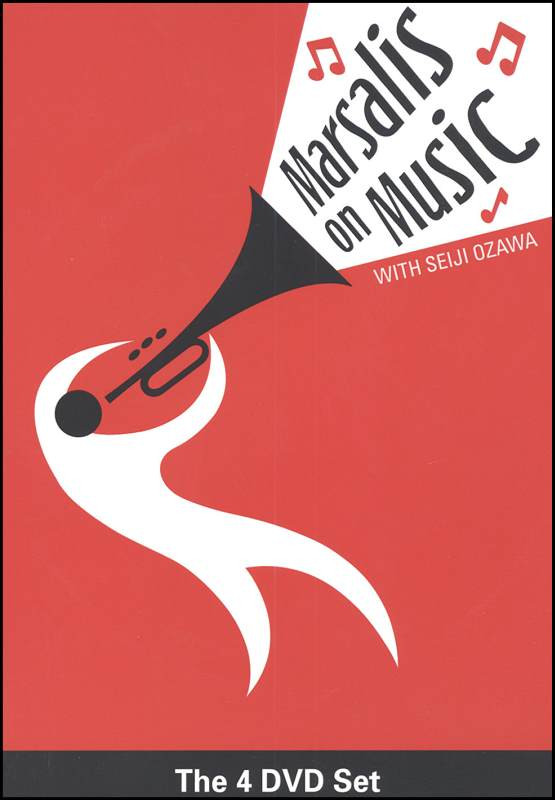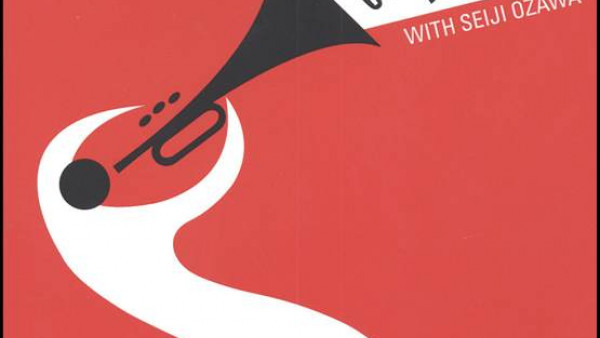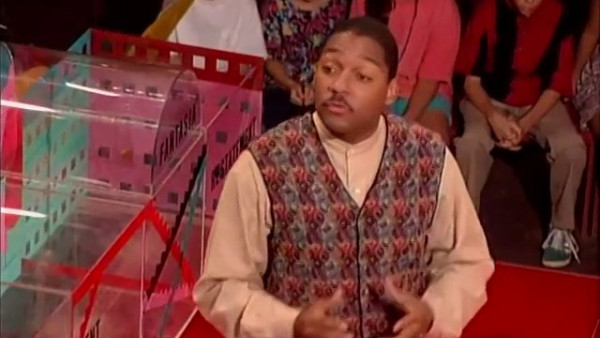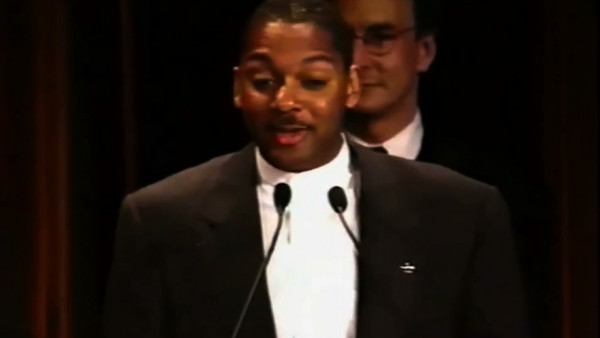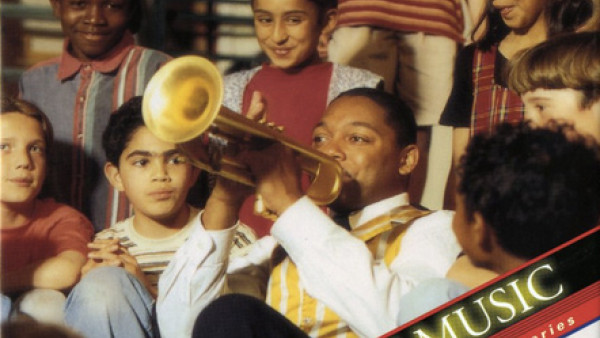The Pied Piper of Jazz
*The Pied Piper of Jazz : You can call Wynton Marsalis an accomplished musician, a great teacher or a respected bandleader, but his friends just call him Hoghead. *
“Listen to this, man.”
In the background, over the phone from his comfortable Manhattan apartment, Wynton Marsalis chuckles as he plays the piano.
“Now I’m gonna do some blues.”
The piano chords move into the open rhythms of New Orleans style.
“I’m gonna sing you a chorus of ‘Hoghead’s Blues,’ ‘cause that’s what my friends call me—Hoghead.”
Marsalis’ sweet, almost innocent-sounding tenor rings through the phone, singing in an ancient blues style:
“ ‘Cause I take my time. Take my time. Take my, I take my, I take my time. . . . Lord, I take my time. Oooo, gather ‘round, listen to old Hoghead’s rhyme.’ “
The phrase concludes with Marsalis’ cackling laugh.
“After that,” he adds, “I start making up nasty rhymes: [Singing, again] ‘Sweet as watermelon, ruby red, down to the rind.’ “
“I’m just here messin’ with my partners and makin’ up some blues to make fun of them,” he says with a laugh.
Make no mistake about it, however, this carefree prankster is the same Marsalis who has received honorary doctorates from Princeton and Harvard and who has conducted hundreds of seminars and master classes. The same Marsalis who is the artistic director of the Jazz at Lincoln Center program and who has received eight jazz and classical Grammys in the last decade and a half.
“Man,” he replies, uninterested for the moment in such matters, “I’m gonna play another blues for you.”
And so he does, his unpretentious pianistic technique in no way limiting the spirit, the enthusiasm or the sheer infectious rhythmic drive of his playing.
Marsalis’ career has been energized by a similar drive since he began his recording career as a leader in the early ’80s at age 21. Almost universally praised and admired for his playing, his composing and his persistent jazz advocacy, he has also been criticized by a small group of purists who accuse him of musical conservatism and racial bias. But there can be no question that he has almost single-handedly brought jazz back to a prominence it has not experienced in three decades.
Marsalis, who turns 34 on Oct. 18, is taking his game up a level, leaping into a cycle of activities that will propel him well beyond the jazz world. Here’s the short list of what he’s got on his overflowing plate:
- Tonight, he will kick off the UCLA Center for the Performing Arts season with an appearance at the Wiltern Theatre with the Lincoln Center Jazz Orchestra. The program will include excerpts from his highly acclaimed oratorio “Blood on the Fields,” as well as works by Duke Ellington, Charles Mingus, Thelonious Monk and others.
- This month, a Marsalis-hosted radio program, “Making the Music,” premieres on National Public Radio. The 26-week series, airing locally at 11 p.m. Tuesdays on KPCC-FM (89.3) in Pasadena, will cover an amazing array of material, from New Orleans, the blues and swing music to Ellington, the jazz avant-garde and jazz singing. (Since Wynton’s brother Branford already hosts “JazzSet,” NPR now has what is surely the only brother act in the history of jazz radio.)
- Monday on PBS, the four-part series “Marsalis on Music” premieres with the trumpeter as host. A book and CD, expanding on the information in the programs, will be published the same day by W.W. Norton & Co. It is the second volume Marsalis has released within a year. (His first, “Sweet Swing Blues on the Road,” a collaboration with photographer Frank Stewart, written in 12 chapters paralleling the 12 measures of the blues, chronicles the colorful images and sensations of a year in Marsalis’ life in jazz.)
The series, which airs at 8 p.m. on KCET Channel 28, features Marsalis in a visually and aurally imaginative examination of the fundamentals of jazz and classical music that employs colorful graphics and computer animation, his own jazz band (featuring players from the Lincoln Center Jazz Orchestra) and the students of the Tanglewood Center Orchestra, conducted by Seiji Ozawa. In one episode, Marsalis is also joined by cello virtuoso Yo-Yo Ma.
Does all this activity bring the name Leonard Bernstein to mind?
It should. Think of the similarities: multi-hyphenate composer-performer-educator; talent that crosses genre lines; leadership of a musical ensemble in a large arts center. Nor would it be inaccurate to describe Marsalis’ goals for the PBS series as consistent with those of Bernstein’s classic “Young People’s Concerts,” broadcast on CBS in the ’60s.
“I’ve seen almost all of the ‘Young People’s Concerts,’ “ Marsalis says. “I went and got all of the scripts, and the Bernstein Foundation was very cool. They said they felt what we were doing was great. So I’m trying to continue that legacy of education in music.”
As with Bernstein and the “Young People’s Concerts,” “Marsalis on Music” presents the trumpeter in a far-reaching, expository role that clearly identifies him as a major new spokesman for the arts.
But if the identification with Bernstein holds true in terms of style, manner and—maybe—talent, it is definitely out of sync in one crucial element. When Bernstein moved to television pedagogy in the ’60s, it was a logical extension of his lofty position as an established leader of the creative community via his role as conductor of the New York Philharmonic, a brilliant pianist and a successful Broadway composer.
Marsalis has accomplished what he has only by continually pushing the envelope of his experience and ability. It is impossible to recall any African American jazz-based artist, young or old, ever having achieved such a broad-based position.
But it’s not surprising.
He has been a class act from the beginning. Making a commitment to play mainstream jazz in the early ’80s was a courageous decision for a young player. To some, at the time, it even seemed quixotic. Fusion, pop and rock were in full flight, and few musicians in their 20s were willing to devote themselves to an expressive form that most saw as a vestige of the past.
Marsalis not only made the commitment, but he persuaded other young players to do so too. His 1982 debut album, “Wynton Marsalis”—featuring Branford on tenor saxophone, Kenny Kirkland on piano and Jeff (Tain) Watts on drums—was a clarion call to an emerging generation of musicians. A string of influential recordings followed, first from Marsalis’ quintet, later from a septet.
Equally important, he matched the authenticity of his playing with outspoken arguments—offered wherever he could find a forum—urging players to re-examine and rediscover the creative nourishment to be found in the roots of jazz. The highly publicized young lions who have arrived in recent years—the Joshua Redmans, Christian McBrides, James Carters and Jacky Terrassons—owe a tremendous debt to Marsalis for having created a receptive environment for their work.
It is not an exaggeration to suggest that the jazz renaissance of the ’90s probably wouldn’t have taken place without Marsalis’ energetic groundwork and continuing dedicated efforts to keep it alive.
Everywhere he appears, Marsalis carries the jazz torch. In December, at a book signing in Los Angeles, he was warm, witty and responsive. And with the ease of an experienced public figure, he quickly measured, and responded to, the ambience of different bookstores.
At Book Soup in West Hollywood, when he was asked how to define good jazz, he replied: “If it swings and has some blues, that’s a start.” To another questioner, he replied that both jazz and classical music “are important to me—but in ways that are different.”
The following day, at Eso Wan bookstore in Inglewood, he took a more declamatory style. When asked to “address the issues raised by your Lincoln Center critics,” Marsalis responded by reading passages from his book and adding spontaneous responses that mixed street humor with an intellectually well-founded argument in favor of self-reliance and self-acceptance.
It was an impressive performance from a clearly much-admired figure who, when asked if he has any aspirations—perhaps political—beyond music, burst out laughing:
“Man, are you kidding? Can you see me in the middle of a debate about some issue and they’d interrupt me to ask about the fact that I’ve had children and I’m not married?” says Marsalis, the bachelor father of two sons under age 10.
Still, there’s no denying that Marsalis doesn’t need his trumpet to move an audience. His verbal presentations often are so effective, the electricity he generates as a communicator so highly charged, that his audiences can be more responsive to his musical discussions than to the music itself. At a Hollywood Bowl concert in August, for example, listeners who appeared captivated by Marsalis’ descriptions of New Orleans jazz and trumpeter Buddy Bolden merely applauded politely when the music itself was performed.
In December, a Time magazine cover story selected him as one of 50 of “America’s most promising leaders age 40 and under,” identifying Marsalis as “a prodigiously talented trumpeter, a favorite son of New Orleans and, almost literally, a Pied Piper.”
Interestingly, Marsalis was chosen despite the fact that, as Time explained, athletes and entertainers were not listed unless their genius extended to activism (as in Marsalis’ case), evangelism or entrepreneurship (as in the selection of Oprah Winfrey).
Watching Marsalis in action with the young people in the PBS series immediately makes it clear why he is, in fact, such a Pied Piper. Relaxed and casual in a multihued vest, he is alternately as funny and supportive as a favorite uncle, as bossy and demanding as a big brother.
He is quick to use metaphors that kids can understand. Describing rhythmic accents, for example, he dribbles a basketball, demonstrating the difference between a steady beat, or dribble, and one that shifts and changes emphasis. As he does so, he adroitly bounces the ball between his legs and behind his back.
“See, if you dribble in a steady beat,” he explains with a sly smile, “somebody’s going to take the ball away from you.”
Like all good educators, he has an implicit trust in his material, convinced that the music he is presenting has powers beyond the didactic process of learning.
“In our ‘Jazz for Young People Concerts’ at Lincoln Center,” Marsalis says, “the kids’ll be talking and running up and down, and I tell the parents to let them go. ‘Cause that’s how I grew up learning. My father [veteran New Orleans pianist and educator Ellis Marsalis] would be having some classes and, man, we weren’t paying attention at all.
“But pretty soon you just pick it up, you get a feeling for it. And that’s kind of the feeling that I like to have in what I’m doing. It’s like this: If you want to check it out, good. If you don’t, that’s fine too. One day, if you want to come to it, it’ll be there, available for you.”
Not exactly a tough-love teaching style, but Marsalis is convinced that it works. In one-on-ones with students, however, he can be considerably more direct, not hesitating to reprimand a player for poor intonation or to demand a readjustment of an embouchure (the way the mouth is configured to play a wind instrument).
But Marsalis’ reprimands, despite their directness, are couched in a kind of amiable togetherness, a we’re-all-in-search-of-the-music mutuality that is disarming to both large audiences and individual musicians.
Last winter, when a 14-year-old with a trumpet showed up at the Book Soup signing, Marsalis interrupted his autographing to take the youngster aside and give him an impromptu lesson.
“Now remember what I told you,” he said. “Play long tones every day for at least 15 minutes.”
“Yes, sir,” said the wide-eyed boy. “Thank you, Mr. Marsalis.”
It was a scene that has been repeated dozens of times since—and that is not unlike his interaction with the young people in episodes of “Marsalis on Music.” Even when his deadlines are the most demanding, Marsalis seems to find time for the eager young musicians who wait for him after every show.
His ease as a teacher undoubtedly traces to his having grown up in a family of musicians in an environment in which learning was given high priority. His father has long been a highly praised New Orleans educator, and three of his five brothers—saxophonist Branford, drummer-producer Delfeayo and drummer Jason—have successful musical careers of their own.
Marsalis on the bandstand, Marsalis’ following Bernstein’s path to television, Marsalis as educator—these are images far different from the one drawn through the years by his detractors, who have called Marsalis a racial separatist who is pompous and musically narrow-minded, with an excess of attitude.
Even Marsalis’ adherents acknowledge that, in public, the trumpeter can seem aloof. But, in the years when he seemed to be a lightning rod for criticism, a cool, self-possessed manner may simply have been his most effective means of canceling out the negative energy coming at him. At that time, his initial reaction was to meet the opposition head on.
“Look at it this way,” Marsalis said last year, during a particularly difficult spate of criticism related to alleged racial favoritism in his artistic stewardship of the Jazz at Lincoln Center program. “You can’t expect to get into a fight and not get hit.”
And he did get hit. The Lincoln Center Jazz Orchestras have always included white musicians, and he has drawn both African American and white jazz experts to the Lincoln Center program. Even so, he has been sniped at for preferring younger musicians, for replacing white players with black players, for assigning composition commissions to himself and for having an excessively conservative view of jazz.
Most of the criticism—particularly that related to racial favoritism—has been rather questionable. Last year, he underlined that point by offering a breakdown of the musicians who have appeared as part of the Lincoln Center program.
“One hundred seventy-eight are black,” Marsalis said. “That’s 56%. Ninety-eight are white; that’s 31%. Forty-one are Hispanic; that’s 13%.”
He notes further that there have been three white conductors, that half of the 14 lecturers have been white and that the 18-piece orchestra generally has seven or eight white musicians.
And, whether or not one agrees with Marsalis’ philosophical view of jazz, he is, after all, the artistic director of the Lincoln Center jazz program. As such, he has, and should have, as much leeway in shaping that program as any other manager of an arts organization. That his agenda, at the moment, is oriented toward the mainstream rather than the avant-garde is clearly within his decision-making power.
After a decade of such sniping, Marsalis has learned, sometimes painfully, some subtle ways to respond to his detractors.
“I don’t get mad anymore,” he says, “and that’s what bothers those mothers even more. I want to laugh about it half the time. Because there’s some really antebellum stuff out there, and it’s not accurate. I mean, the director of the Lincoln Center jazz program is white. So how can it be racist?
“But people still keep attempting to influence the public negatively. But there’s nothing that [detractors] can do about it, because the grass-roots support for what we’re doing at Lincoln Center is so great.”
Marsalis has also answered his critics with his most effective weapons of all: his horn playing, his compositions and his educational achievements.
He has demonstrated a remarkable ability to move back and forth between classical music and jazz that is virtually unprecedented, with the possible exceptions of Benny Goodman and Keith Jarrett. In addition to his work with the Lincoln Center ensemble, Marsalis occasionally leads his own groups, continues to record—most recently with his father on material for a Charlie Brown TV special—and has written ballet music for Peter Martins, Garth Fagan and Twyla Tharp.
Inevitably, any conversation with him seems to wind up with music talk, and the playful Marsalis re-emerges. Ask him about his approach to composition, and an aurally illustrated presentation takes place:
“See,” he says over the phone, “I always try to combine the oldest thing I know with the newest. Like this . . . [singing a basic, early jazz-styled melody as he accompanies it on the piano], and it has a shuffle rhythm, which is the basic rhythm of all jazz and all blues.
“Then I start introducing tone after tone, flatted fifths and stuff like that. Then I’ll start messing with the rhythm—playing fives and stuff that you know Buddy Bolden never played.” (The sound of Marsalis’ trumpet, playing a series of licks, echoes through the phone.)
“Like that. Still the same rhythm, but there’s more tension in the chords.” (Marsalis’ piano returns.)
“Then we take it back again.” (He rips off another trumpet phrase.)
“Then I add a little of this [he plays with a growl tone] and this [scat-singing a few lines], and that’s it. Right back to New Orleans.”
by Don Heckman
Source: Los Angeles Times

